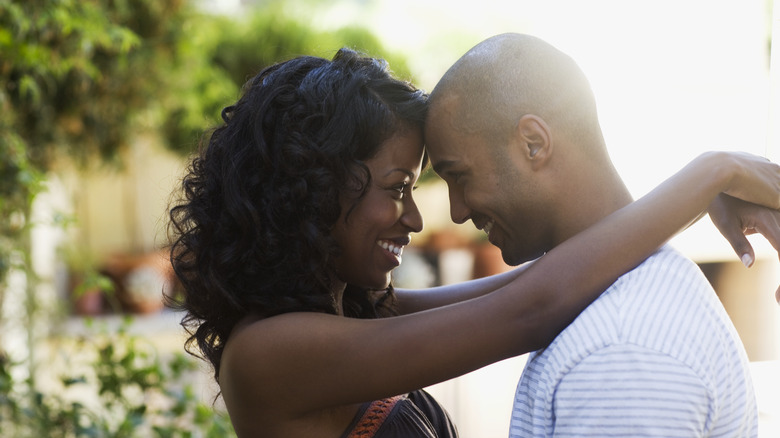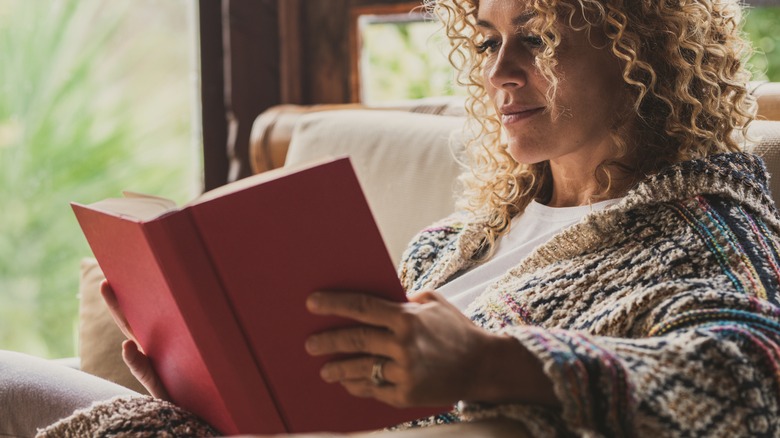Spotting The Thin Line Between Love And Codependency
When you fall in love with someone, you start spending a lot of time together. Your world meshes with theirs. Your partner's general well-being, their life goals, and their likes and dislikes are things you'd start thinking about. If they're unwell, you worry about them. If they're having a bad day, you want to try to make them feel better. While all of these intentions sound innocent, there is a thin line where genuine care for someone can tip over to an unhealthy place.
If the Netflix series "You" starring Penn Badgley taught you anything, it's that Joe Goldberg (charismatic and handsome as he is) doesn't quite have the healthy love thing figured out. One such unhealthy relationship dynamic occurs when you're in a codependent relationship. Relationship expert and author Margaret Paul, writing to Mbgrelationships, explained that couples don't even realize they're in a codependent space because the entire situation can feel comfortable and comforting, especially at first.
So how can you tell if the intense affection you're feeling for your significant other (and the behavior that accompanies it) are within the realms of what they should be? Yes, falling in love can feel all-consuming and wonderful, but spotting the difference between love and codependency could be what makes or breaks your relationship. Here is some information to ponder if you're not sure where your romance lands.
Codependency stems from a place of insecurity
By definition, codependency occurs when one partner starts prioritizing their significant other's needs and wants above their own. There might be difficulty in drawing a line where one partner's sense of self ends and the other's individuality begins. If your happiness is so closely tied to your partner's that you can't be content unless and until they are happy, you might be in a codependent union.
Relationship expert Margaret Paul actually used the word "manipulation" in reference to codependency. Stemming from a place of low self-worth, one person in the relationship might take on the role of an eternal custodian — always doing or saying things to make sure their significant other is happy so that they themselves can feel valued. On the other side of that coin, codependency can also develop if one partner is unable to make themselves happy on their own and they're constantly looking to their partner to meet their needs. Either end of this is not sustainable in the long run, as the giver can suffer from feelings of anxiousness, exhaustion, and neglect, while the taker would typically experience feelings of emptiness because they're reliant on their significant other to feel any sense of joy or fulfillment.
In a healthy loving relationship, both parties have a good sense of self and there's a fair amount of give and take. You're each able to make yourselves happy, independent of the other.
How to get out of a codependent dynamic if you're in one
The first step would be to ask yourself some important questions. Being codependent might very well be a blind spot that's sabotaging your relationship. Does your happiness depend on your partner? Are you taking care of your partner's emotions because you're afraid of losing them? Do you think you'd have a sense of self if you and your significant other broke up? If you answered "no" to those questions, you might want to read on.
You can begin by telling yourself that you're not responsible for your partner's emotions or happiness and vice versa. This might be especially tricky during an argument, so if it helps, walk away if your partner is demanding that you make them feel better. Come back to the conversation when both of you can approach it more calmly and rationally. Try to put your needs first from time to time. If you're someone who struggles with a sense of identity or self-worth, you can try reaching out to a professional therapist for help. Spending time with friends and family by yourself could help too.
Relationship expert Margaret Paul writes about the importance of self-love and working on any abandonment issues you might have (via Mbgrelationships). "Even if just one of you decides to learn to love yourself rather than continue to reject and abandon yourself, you can change your codependent relationship to a loving, interdependent relationship," she explains.


